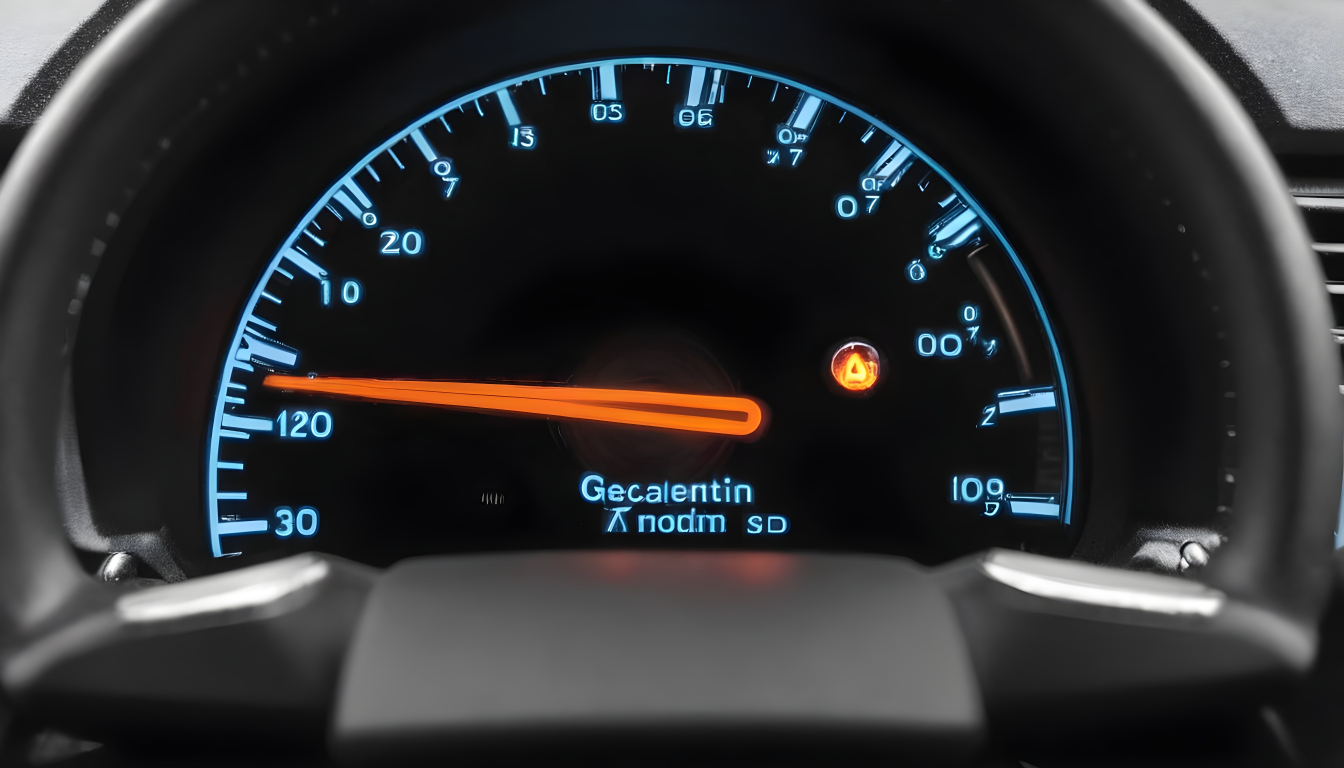Car sputtering when accelerating: Have you ever experienced a situation where your car idles smoothly but sputters when you step on the gas?
If so, you are not alone.
This is a frustrating problem that many drivers face, and it can affect your car’s performance and fuel efficiency.
In this article, I will explain what causes a car to idle fine but sputter when accelerating, and how you can fix it. I will cover the following main points:

The role of the fuel system
One of the most common causes of a car sputtering when accelerating, despite idling fine, is a problem with the fuel system.
The fuel system, crucial for optimal engine performance, ensures the delivery of the correct amount of fuel based on the car’s speed and load.
Comprising key components like the fuel pump, fuel filter, fuel injectors, and fuel pressure regulator, any malfunction within this system can lead to issues with acceleration.
If any of these components within the fuel system are clogged, dirty, damaged, or malfunctioning, they can disrupt the flow and pressure of fuel, leading to either a lean or rich fuel mixture.
A lean fuel mixture occurs when there’s insufficient fuel for the amount of air in the engine, while a rich fuel mixture indicates an excess of fuel relative to air.
Both situations can adversely affect engine performance, particularly during acceleration, resulting in the car sputtering when accelerating despite idling fine.
To fix this problem, you need to check the condition and performance of your fuel system components and replace or clean them if needed.
You can also use a tool like [Fuel System Cleaner] to remove any deposits or contaminants from your fuel system and improve its efficiency.
CMTOOL Fuel Injector Cleaner Tool Kit 1000ML 150PSI Fuel Injection Cleaner Canister Automotive Injector Cleaner Non Dismantle Car Fuel Injection Cleaning Machine Auto Gasoline Fuel System Cleaner Kit
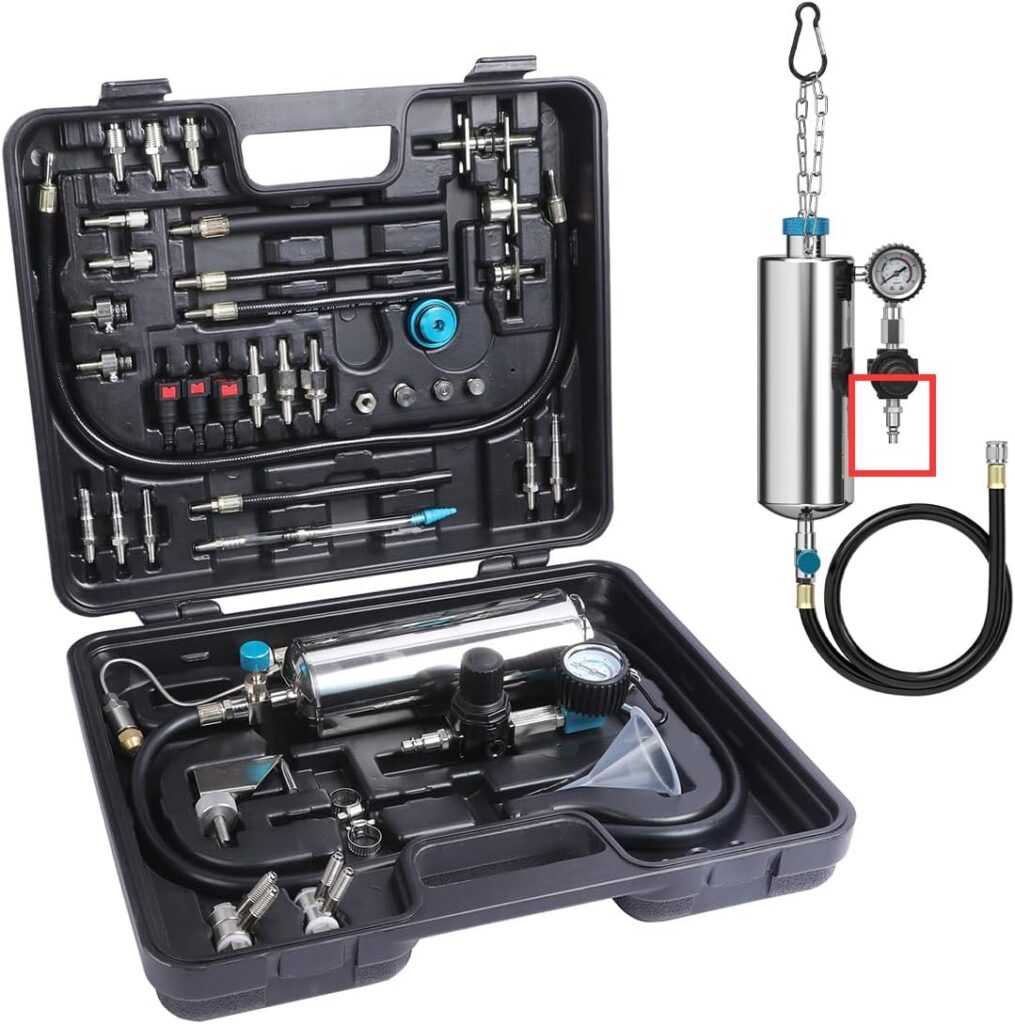
The role of the engine sensors
Another potential culprit behind a car idling fine but sputtering when accelerating is an issue with the engine sensors.
These sensors play a critical role in monitoring various aspects of engine performance and transmitting signals to the engine control module (ECM).
Subsequently, the ECM adjusts crucial parameters such as fuel injection and ignition timing to optimize engine operation. Key engine sensors include:
- The oxygen sensor measures the amount of oxygen in the exhaust gas and helps the ECM to maintain the optimal air-fuel ratio. A faulty oxygen sensor can cause the ECM to inject too much or too little fuel, resulting in a rich or lean fuel mixture. This can cause the engine to sputter, especially when accelerating.
- The mass airflow sensor measures the amount of air entering the engine and helps the ECM to calculate the fuel injection rate. A dirty or malfunctioning mass airflow sensor can provide inaccurate readings, causing the ECM to inject the wrong amount of fuel. This can also cause the engine to sputter, as the air-fuel ratio is disturbed.
- The crankshaft position sensor, crucial for detecting the position and speed of the crankshaft, aids the ECM in determining ignition timing, potentially affecting a car sputtering when accelerating despite idling fine. If this sensor malfunctions, it can lead to the ECM firing the spark plugs at incorrect intervals, causing poor combustion and misfires. Consequently, the engine may sputter and stall, particularly during acceleration.
To fix this problem, you need to check the condition and performance of your engine sensors and replace or clean them if needed.
You can also use a tool like [OBD2 Scanner] to scan the engine for any trouble codes that indicate a sensor problem.
ANCEL AD310 Classic Enhanced Universal OBD II Scanner Car Engine Fault Code Reader CAN Diagnostic Scan Tool-Black
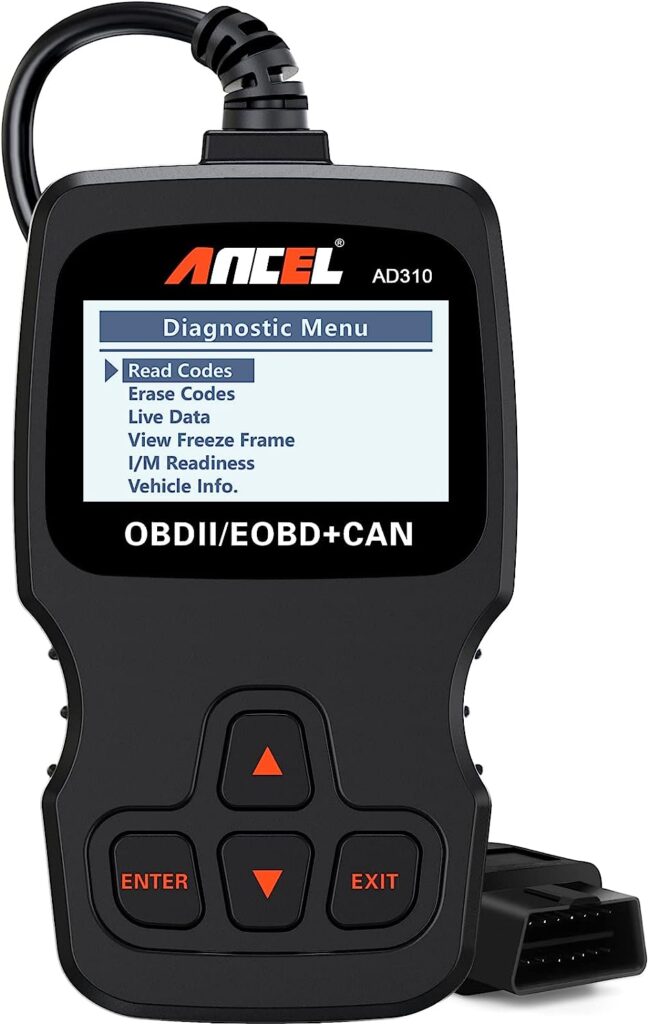
The role of the exhaust system
Another potential factor contributing to a car sputtering when accelerating despite idling fine is a problem with the exhaust system.
Responsible for expelling exhaust gases from the engine while minimizing noise and emissions, the exhaust system comprises various components including the exhaust manifold, catalytic converter, muffler, and tailpipe.
Any malfunction within this system can lead to disrupted engine performance, potentially causing the car to sputter during acceleration despite idling smoothly.
If any of these components are damaged, leaking, or blocked, they can affect the engine performance and cause sputtering. For example:
- A cracked or leaking exhaust manifold can allow unburned fuel and air to escape, resulting in a loss of power and fuel efficiency.
- A clogged or faulty catalytic converter can restrict the flow of exhaust gases, creating back pressure and reducing the engine power. A catalytic converter can also overheat and melt, causing fragments to block the exhaust pipe.
- A damaged or rusted muffler can create holes or cracks, allowing exhaust gases to leak and create noise and vibration.
To fix this problem, you need to check the condition and performance of your exhaust system components and replace or repair them if needed.
You can also use a tool like [Exhaust System Tester] to detect any leaks or blockages in your exhaust system.
FOXWELL ST201 Automotive Smoke Machine Built-in Air Compressor, EVAP Vacuum Exhaust Engine System Pipe Diagnostic Tester, High Pressure Smoke Leak Detector for All DC12V Vehicles
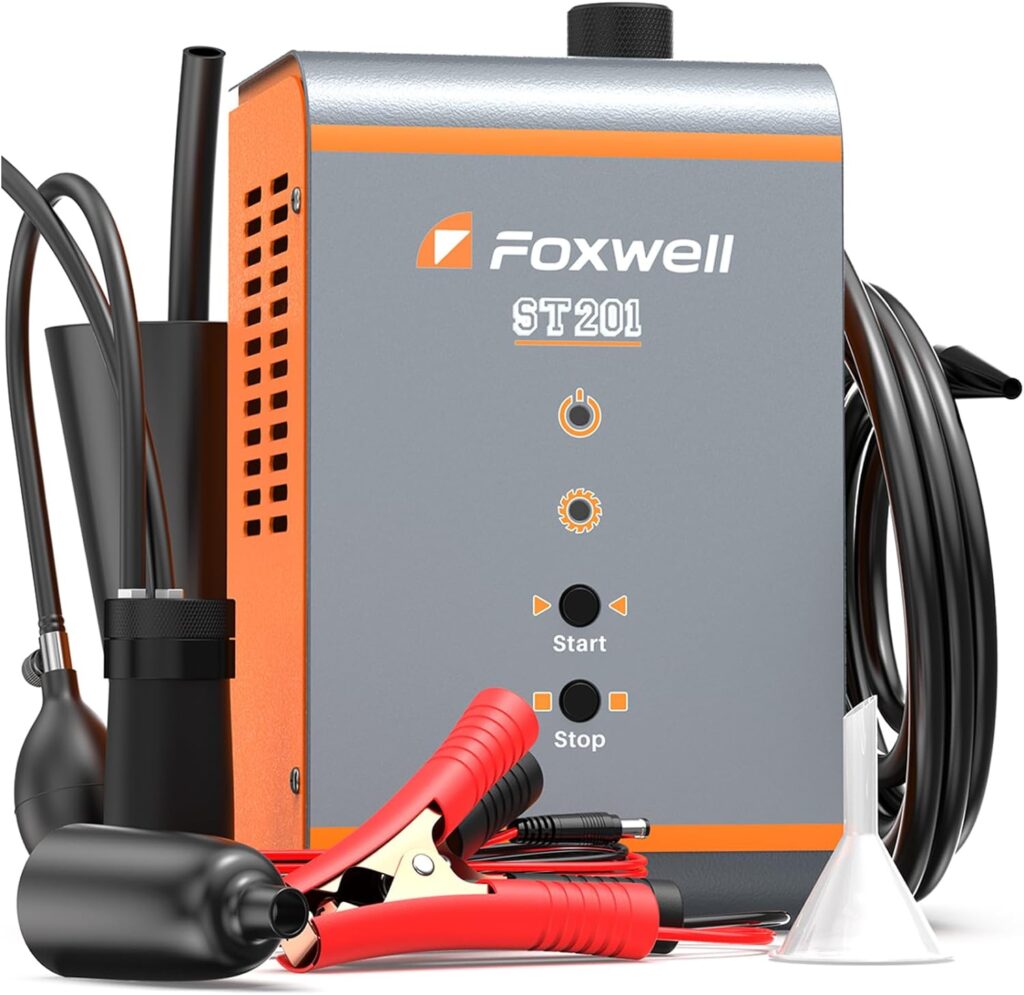
The role of the spark plugs
Another potential cause of a car sputtering when accelerating despite idling fine is a problem with the spark plugs.
Spark plugs play a crucial role in igniting the fuel-air mixture in the engine cylinders, generating the power necessary to move the car.
If the spark plugs are worn out, dirty, or faulty, they may fail to produce a strong enough spark to efficiently burn the fuel.
Consequently, this can lead to a loss of power, hesitation, or sputtering during acceleration.
To fix this problem, you need to inspect the spark plugs and replace them if necessary.
You can also use a tool to check the condition of your spark plugs and see if they need to be replaced.
Here are some tips to maintain your spark plugs:
- Replace your spark plugs according to the manufacturer’s recommendation, usually every 30,000 to 60,000 miles.
- Use the correct type and size of spark plugs for your car, as specified in the owner’s manual or on the label under the hood.
- Avoid using cheap or low-quality spark plugs, as they may not last long or perform well.
- Keep your engine clean and well-tuned, as carbon deposits, oil leaks, or rich fuel mixtures can damage your spark plugs.
The role of the air filter
Another potential cause of a car sputtering when accelerating despite idling fine is a problem with the air filter.
The air filter plays a crucial role in cleaning the air entering the engine by removing dust, dirt, and debris.
Ensuring that the engine receives sufficient clean air to mix with the fuel and facilitate proper combustion, a malfunctioning air filter can disrupt this process, leading to issues such as sputtering during acceleration.
If the air filter is dirty, clogged, or damaged, it can hinder the amount of air entering the engine, potentially leading to a rich fuel mixture.
A rich fuel mixture occurs when there is an excess of fuel relative to the amount of air in the engine, which can adversely affect engine performance, particularly during acceleration.
Therefore, a malfunctioning air filter may contribute to a car sputtering when accelerating despite idling fine.
To fix this problem, you need to inspect the air filter and replace it if necessary.
You can also use a tool like [Air Filter Cleaner] to remove any dirt or dust from your air filter and improve its performance.
Here are some tips to maintain your air filter:
- Replace your air filter according to the manufacturer’s recommendation, usually every 12,000 to 15,000 miles.
- Use the correct type and size of air filter for your car, as specified in the owner’s manual or on the label under the hood.
- Avoid using cheap or low-quality air filters, as they may not filter the air properly or last long.
- Keep your engine bay clean and free of debris, as dirt and dust can clog your air filter.
Portable Air Filter Blaster
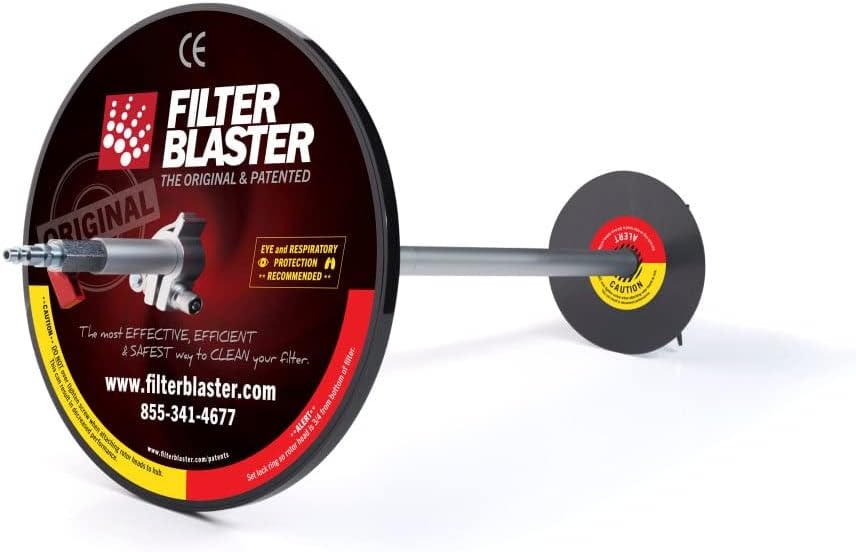
Car sputtering when accelerating: The role of the fuel filter
Another potential cause of a car sputtering when accelerating despite idling fine is a problem with the fuel filter.
The fuel filter serves to filter the fuel before it reaches the engine, effectively removing impurities, dirt, or debris.
By ensuring that the engine receives clean and high-quality fuel to mix with the air for proper combustion, a malfunctioning fuel filter can disrupt this process, potentially leading to issues such as sputtering during acceleration.
If the fuel filter is dirty, clogged, or damaged, it can reduce the flow and pressure of the fuel, resulting in a lean fuel mixture.
A lean fuel mixture means that there is not enough fuel for the amount of air in the engine, which can cause the engine to run poorly, especially when accelerating.
To fix this problem, you need to inspect the fuel filter and replace it if necessary.
You can also use a tool like [Fuel Filter Wrench] to remove and install the fuel filter easily.
Here are some tips to maintain your fuel filter:
- Replace your fuel filter according to the manufacturer’s recommendation, usually every 15,000 to 30,000 miles.
- Use the correct type and size of fuel filter for your car, as specified in the owner’s manual or on the label under the hood.
- Avoid using cheap or low-quality fuel, as it may contain more impurities or water that can clog your fuel filter.
Colar/Vent Cap Fuel Filter Wrench Metal for 380134 382 Compatible with Detroit Diesel Truck Cummins Engines with 6 inch Inner Diameter
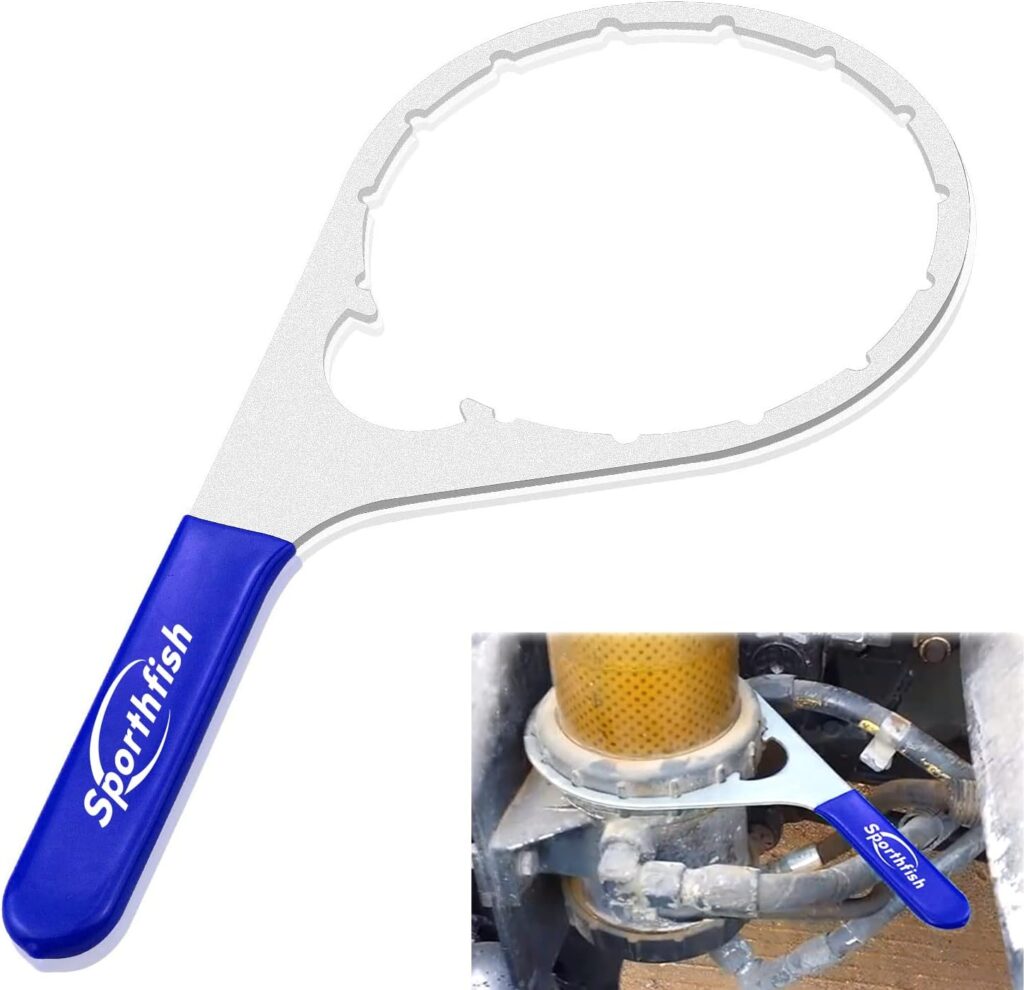
Car sputtering when accelerating: The role of the vacuum system
Another potential cause of a car sputtering when accelerating despite idling fine is a problem with the vacuum system.
The vacuum system, consisting of a network of hoses and valves, utilizes the engine’s intake manifold vacuum to operate various components such as the brake booster, EGR valve, PCV valve, and purge valve.
If there’s a malfunction within the vacuum system, it can lead to disruptions in engine performance, potentially contributing to issues like sputtering during acceleration.
If any of these hoses or valves are cracked, loose, or leaking, they can allow unmeasured air to enter the engine, resulting in a lean fuel mixture.
A lean fuel mixture means that there is not enough fuel for the amount of air in the engine, which can cause the engine to run poorly, especially when accelerating.
To fix this problem, you need to inspect the vacuum system and repair or replace any damaged hoses or valves.
You can also use a tool like [Vacuum Gauge] to measure the vacuum pressure and detect any leaks in the system. Here are some tips to maintain your vacuum system:
- Check your vacuum system regularly for any signs of wear or damage, such as cracks, holes, or loose connections.
- Replace your vacuum hoses and valves according to the manufacturer’s recommendation, usually every 60,000 to 90,000 miles.
- Use the correct type and size of vacuum hoses and valves for your car, as specified in the owner’s manual or on the label under the hood.
- Avoid using cheap or low-quality vacuum hoses and valves, as they may not seal properly or last long.
Hromee Fuel Pump and Vacuum Tester Gauge, Carburetor Pressure Diagnostics Leakage Tool Kit
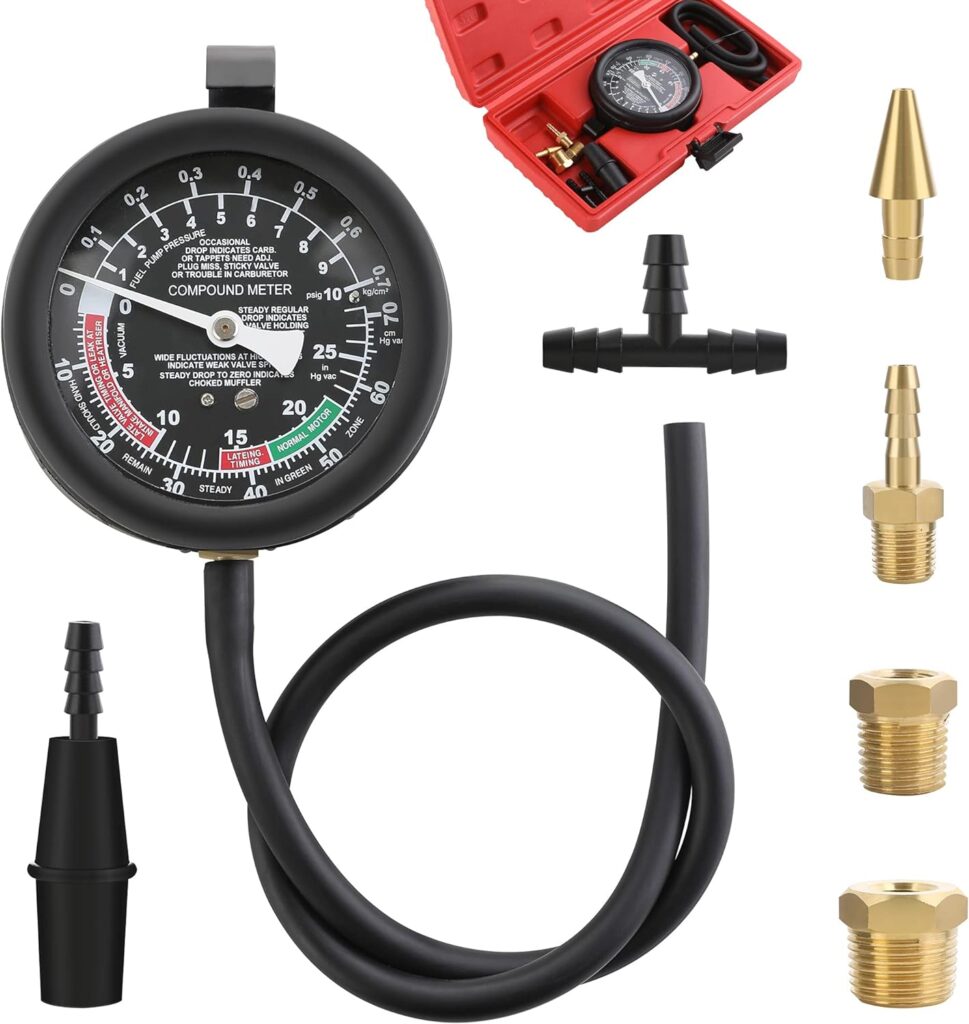
Car sputtering when accelerating: Conclusion
In this article, I have explained what causes a car to idle fine but sputter when accelerating, and how you can fix it. I have covered the following main points:
- The role of the fuel system
- The role of the engine sensors
- The role of the exhaust system
- The role of the spark plugs
- The role of the air filter
- The role of the fuel filter
- The role of the vacuum system
By following the tips and suggestions I have provided, you can diagnose and repair this common problem, and improve your car’s performance and fuel efficiency.

